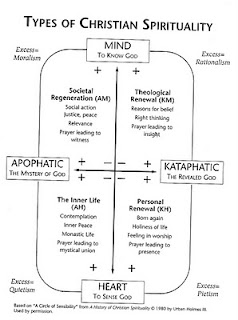Helping...? I'm not sure
Compassion is something that I have been exploring with regards to mission recently, so to read John Walter's article at theRubicon - Compassion or Co-Dependence? brought mixed emotion. He asks some good questions. Some would say that simple acts of compassion are a distraction from the 'church work' proper - I'm don't think that John is exploring that. What he is asking - and it is a real issue - is when does compassion create the problem of co-dependence? It is a question that we keep in tension.
I'm not sure how much we have been helping Pierre. Every fortnight for two maybe even three years Pierre has been coming in for food parcels. His thick French accent makes a change to Eastend cockney. A nice guy. Pleasant to chat with.
As I went off to our store of tinned food I thought really things for Pierre haven't got better and we just keep giving him food like a tamed stray cat. So I told him.
He smiles and with a shrug says "Three years perhaps..."
"Pierre I worry ... we have just been giving you food and I not sure we are helping you!" I explain that the food really is for emergencies and his has been a very long emergency.
He explains how his benefits run out, leaving him short every fortnight and that he needs food. "Not helping me?" he looks at me incredulously. "I'm not stealing cars ... or dealing drugs ... mugging old ladies ... shop lifting ... of course you are helping me!!"
I get his sentiment but I'm not sure. We agree to meet up and talk about budgeting. He leaves and I am left wondering if we are helping or not.
I'm not sure how much we have been helping Pierre. Every fortnight for two maybe even three years Pierre has been coming in for food parcels. His thick French accent makes a change to Eastend cockney. A nice guy. Pleasant to chat with.
As I went off to our store of tinned food I thought really things for Pierre haven't got better and we just keep giving him food like a tamed stray cat. So I told him.
"...I'm not stealing cars ... or dealing drugs ... mugging old ladies ... shop lifting ... of course you are helping me..."
"Pierre how long have you been popping in for food parcels?" He smiles and with a shrug says "Three years perhaps..."
"Pierre I worry ... we have just been giving you food and I not sure we are helping you!" I explain that the food really is for emergencies and his has been a very long emergency.
He explains how his benefits run out, leaving him short every fortnight and that he needs food. "Not helping me?" he looks at me incredulously. "I'm not stealing cars ... or dealing drugs ... mugging old ladies ... shop lifting ... of course you are helping me!!"
I get his sentiment but I'm not sure. We agree to meet up and talk about budgeting. He leaves and I am left wondering if we are helping or not.
"We need to rediscover a compassionate model of holistic ministry for today, where we become involved in others’ lives, working alongside them rather than just paying to have someone else ‘take care of the problem.’" ( John Walter)

Comments
The Jewish community also struggles with this question, but has opted for ongoing food relief for those who are on low levels of benefit, along with giving help in finding work to those able to. Some receive for years, very discretely, and the whole community gives in financially to enable the programme to continue. There is particular concern for elderly, and those on their own, as these seem the hardest hit by low benefit levels.
Compassion, to my thinking has to be intelligent. But it also has to be realistic. As much harm is done by trying to solve someone's problems when all they want to do is have someone listen, as by avoiding the issue of challenging them when failure to manage goes on and on! Again, in the Jewish community, there were different times and places for the two, so someone needing a listening ear did not get confronted with 'why don't you get a job?' etc. I felt that was compassion in practice.